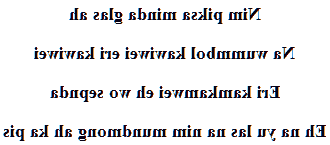North wahgi love poem
Glas
Nim piksa minda glas ah
Na wummbol kawiwei eri kawiwei
Eri kamkamwei eh wo sepnda
Eh na yu las na nim mundmong ah ka pis


→ French poem ←
Jiwakan language
A very short love poem in Wahgi, here in North Wahgi (alternatives : Jiwakan, Yuwe, Banz-Nondugl, Banz, Jiwaka, North Wahgi, Yu Wei, Yu We).
This Jiwakan language, is spoken in the northeastern end of the vast Wahgi Valley, in the western highlands of Mount Hagen, Jiwaka province, central Papua New Guinea, by about fifty thousand people; it is a chimbu language.
This idiom belongs to the central family of the highlands languages of New Guinea. Here is a list of villages where it is spoken: Koskala, Banz, Karap, Nakone, Tsigmil, Nondugl.
We must differentiate the Northern Wahgi from the Southern one, many words are common but the way of expressing oneself is different.
I think you guessed it, jiwaka is a language of purely oral communication, which is used in villages, for everyday life, but often the Waghis consider English as more prestigious than their language. Their literacy is done in English, and it has necessarily weighs in the way they consider their language.
The Wahgi people
The Wahgi people is one of the largest groups in Papua New Guinea; they live in the highlands, which provide them a cool and humid climate.
The province of Jiwaka, where they live, is a province whose creation is quite recent and whose capital is the city of Banz.
They live on livestock (poultry, goats, etc.), and on agriculture (corn, sweet potatoes, beans, coffee, bananas and green vegetables); two practices that are not intensive, but more like gardening than anything else.
Their beliefs, which remain fairly intact and vigorous, are based on rites imbued with witchcraft and magic.
In the Wahgi valley, archaeologists have discovered, buried in their gardens, kinds of mallets with a carved stone at the end (club-head); the Wahgis call them kobiloa (stone).
For the Wahgis, the explanation of their presence is linked to the spirits, they are from a supernatural origin ... children and women must not see them.
I will never enough thank my Papuan friends for their precious contribution, their stone to this edifice, built day after day. This contribution is precious, because even if their languages are so numerous in this reservoir which seems inexhaustible, many still remain to be discovered, before the globalization that nibbles at everything slowly destroy them.